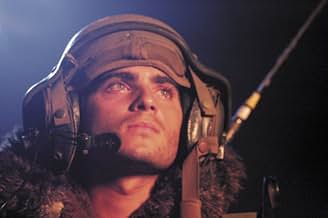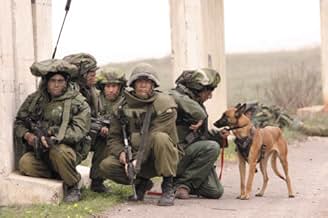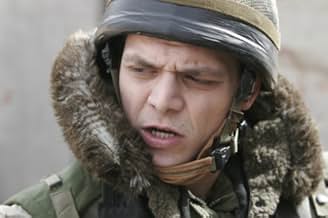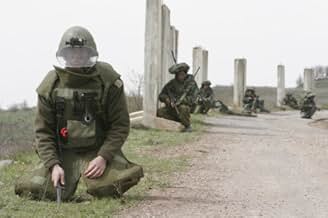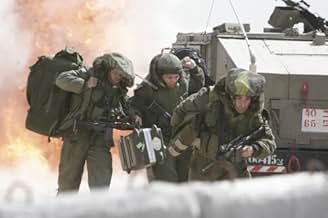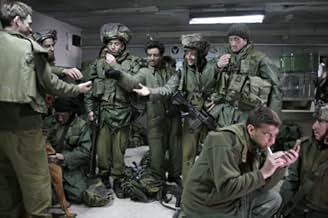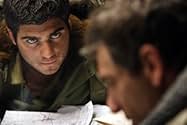VALUTAZIONE IMDb
6,7/10
4966
LA TUA VALUTAZIONE
La storia di un gruppo di soldati israeliani di stanza in un avamposto prima del ritiro delle forze del 2000.La storia di un gruppo di soldati israeliani di stanza in un avamposto prima del ritiro delle forze del 2000.La storia di un gruppo di soldati israeliani di stanza in un avamposto prima del ritiro delle forze del 2000.
- Regia
- Sceneggiatura
- Star
- Candidato a 1 Oscar
- 5 vittorie e 9 candidature totali
Arthur Perzev
- Yonatan Shpitzer
- (as Arthur Faradjev)
Zohar Strauss
- Rossman
- (as Zohar Shtrauss)
Ya'akov Ahimeir
- Self
- (as Yaakov Ahimeir)
Recensioni in evidenza
It's about Israeli soldiers holding down a fort in Southern Lebanon, but it could be about soldiers anywhere. That is what makes this film so memorable.
Lebanon, Afghanistan, Bosnia, Iraq, it is all the same when it comes to politics and the soldiers that have to carry out the policies made by chickenhawks far removed from the front.
It is touching and funny at times. I could really relate to the truck arriving with fresh supplies after a long wait. It is common and a hot meal at midnight is much appreciated when you have been running low.
It shows real soldiers doing real grunt work. It is an outstanding film.
Lebanon, Afghanistan, Bosnia, Iraq, it is all the same when it comes to politics and the soldiers that have to carry out the policies made by chickenhawks far removed from the front.
It is touching and funny at times. I could really relate to the truck arriving with fresh supplies after a long wait. It is common and a hot meal at midnight is much appreciated when you have been running low.
It shows real soldiers doing real grunt work. It is an outstanding film.
This film has just been aired on the Copenhagen International Film Festival and of all the Israeli films available, this was the one I was - not - going to see, and yet I did.
It is still only a few days, since I saw it, but the images return and the sheer originality in terms of being a 'war movie' coupled with the usual Jewish genius of making a point: in short comment, dry humor, body language, tone of voice, well chosen repetition i.e. the monotonous, almost dead, tone over a loudspeaker from the lookouts stationed to warn against 'incoming, incoming' missiles, which after explosion were commented on by,'impact, impact'.
After the third or fourth of these 'scenes' I suddenly felt a wave of claustrophobia and fear, which these young Israeli soldiers must have felt being stuck on a mountain top, without a visual enemy, and only lookouts to rely on for their own lives and safety, 'incoming, incoming' - crash, bang -'impact, impact' - it was unnerving.
This film is a must for anyone - also those who like me, are not war buffs, because it is not about war. It is about a lot of things. Reality, how to handle anxiety, frustration, loss, grief, in a tight and stuck environment, with no relief in sight, (Israel itself?) It is about individuality in terms of different personalities, backgrounds, political opinions who have to make it work and who do in their own humorous, gentle, aggressive, accepting way. It is about men and a male attitude which I have not witnessed for over thirty years,(and sorely missed); the honesty and humanity of men, and it is about exile.
The one lifeline to the home country; a dirt road, has been blocked by a strange explosive device for about a month, and this is where the film starts, with the bomb squad arriving at the outpost, to identify and disarm the device, so that the outpost can receive supplies once again...and a whole 'different' story is touched upon.
I could go on for hours about this film, and not in a very logical way, since all the 'points' haven't been connected yet, it has so many layers. This what I call genius - 'layering' and this is what I look for in Israeli film and this year it was Beaufort, who delivered. Go and see it.
It is still only a few days, since I saw it, but the images return and the sheer originality in terms of being a 'war movie' coupled with the usual Jewish genius of making a point: in short comment, dry humor, body language, tone of voice, well chosen repetition i.e. the monotonous, almost dead, tone over a loudspeaker from the lookouts stationed to warn against 'incoming, incoming' missiles, which after explosion were commented on by,'impact, impact'.
After the third or fourth of these 'scenes' I suddenly felt a wave of claustrophobia and fear, which these young Israeli soldiers must have felt being stuck on a mountain top, without a visual enemy, and only lookouts to rely on for their own lives and safety, 'incoming, incoming' - crash, bang -'impact, impact' - it was unnerving.
This film is a must for anyone - also those who like me, are not war buffs, because it is not about war. It is about a lot of things. Reality, how to handle anxiety, frustration, loss, grief, in a tight and stuck environment, with no relief in sight, (Israel itself?) It is about individuality in terms of different personalities, backgrounds, political opinions who have to make it work and who do in their own humorous, gentle, aggressive, accepting way. It is about men and a male attitude which I have not witnessed for over thirty years,(and sorely missed); the honesty and humanity of men, and it is about exile.
The one lifeline to the home country; a dirt road, has been blocked by a strange explosive device for about a month, and this is where the film starts, with the bomb squad arriving at the outpost, to identify and disarm the device, so that the outpost can receive supplies once again...and a whole 'different' story is touched upon.
I could go on for hours about this film, and not in a very logical way, since all the 'points' haven't been connected yet, it has so many layers. This what I call genius - 'layering' and this is what I look for in Israeli film and this year it was Beaufort, who delivered. Go and see it.
I'm not a fan of the war genre, but Beaufort plays out more as a psychological thriller, and I find it hard to fault. There was an amazing blend of naturalism, stylistic devices, humour, touching human drama and suspense - at one time I jumped in my seat like I never have before.
The camera movements and cinematography are excellent and reinforce a sense of claustrophobia as a group of Israeli soldiers keep guard at an historic fort within southern Lebanon, but are virtually under siege by Hezbollah forces. Character development is also excellent with much authenticity. The film focuses on the idiosyncrasies of various characters and how they interact with each other under the circumstances. Respect for the commanding officer is sometimes lacking, resulting in a lack of discipline and friction at a difficult time.
I count this film as one of my favourite films in the genre, kind of a cross between Stanley Kubrick's Full Metal Jacket and Sam Mendes' Jarhead, and as good as either of these. Like these two films, there is an understated political critique in how young men are pawns in the games played by those who live comfortably away from the field of battle and death. Whether you like war films or not, this is must-see cinema.
I saw the film's screening at the Melbourne International Film Festival.
The camera movements and cinematography are excellent and reinforce a sense of claustrophobia as a group of Israeli soldiers keep guard at an historic fort within southern Lebanon, but are virtually under siege by Hezbollah forces. Character development is also excellent with much authenticity. The film focuses on the idiosyncrasies of various characters and how they interact with each other under the circumstances. Respect for the commanding officer is sometimes lacking, resulting in a lack of discipline and friction at a difficult time.
I count this film as one of my favourite films in the genre, kind of a cross between Stanley Kubrick's Full Metal Jacket and Sam Mendes' Jarhead, and as good as either of these. Like these two films, there is an understated political critique in how young men are pawns in the games played by those who live comfortably away from the field of battle and death. Whether you like war films or not, this is must-see cinema.
I saw the film's screening at the Melbourne International Film Festival.
Considering the sanitized pulp that the United States military participates in the filming of, it is refreshing to see a movie about soldiers that rings true and does not shy away from controversy. The IDF must also be commended for actively participating in the making of a film that does not shine the best light on the occupation of southern Lebanon.
Ultimately it is Israeli politicians and inept commanders that take the brunt of the blame for the appalling conditions the soldiers portrayed in this movie endure while holding on to their mountain top position.
Hezbollah obviously plays a part in this story, yet they are an unseen presence. They are always just out of the frame and sporadically, sometimes shockingly so, they remind everyone involved of their lethal potential.
Set aside your preconceived notions of the Israeli-Arab conflict and see this movie.
Ultimately it is Israeli politicians and inept commanders that take the brunt of the blame for the appalling conditions the soldiers portrayed in this movie endure while holding on to their mountain top position.
Hezbollah obviously plays a part in this story, yet they are an unseen presence. They are always just out of the frame and sporadically, sometimes shockingly so, they remind everyone involved of their lethal potential.
Set aside your preconceived notions of the Israeli-Arab conflict and see this movie.
Right-wing audiences have criticized "Beaufort" for being left-winged, while left-wing audiences have criticized the movie for being right-winged. Immediately that should tell you this is a movie worth watching.
Like all great war films, "Beaufort" avoids situational politics and instead focuses on the broader, universal issue of war which all sides can agree upon: war is hell. Or specifically in this case, war is pointless hell. Here we have an excellent illustration; "Beaufort" is the story of a handful of soldiers who fight admirably to defend a fort, simply so that they can abandon it as planned a few days later. Folks, it don't get any more pointless than that. I would tip my hat to the genius who came up with such a great metaphor, but the funny thing is that the story came straight out of history.
(Note: although this film depicts the Israeli withdrawal from Castle Beaufort which was returned to Lebanon in 2000, it was actually filmed at a different fortress at the Golan Heights in Syrian territory currently held by Israel.)
Joseph Cedar directs this film in a tense, claustrophobic way with narrow, labyrinthine corridors that burrow deep into the mountain. I was instantly reminded of the classic submarine film "Das Boot" and wasn't surprised one bit when I read that Cedar was highly influenced by that film. "Beaufort" shares several qualities with "Das Boot" such as the facelessness of the enemy (all we see are the incoming mortars & missiles), the youth & inexperience of the soldiers (Beaufort's commander is 22 and most of the soldiers are 18- 20 years old), and of course the constricting, suffocating feeling of being stuck in a steel tube while, outside, the powers that be are deciding your fate.
One notable difference between "Beaufort" and "Das Boot" are the infrequent but powerful shots of the gorgeous landscape, the humbling presence of the 12th century ruins, and other scenes of nature which lend a positive breath of fresh air to an otherwise dismal setting. This, I'm sure, was very deliberate on the part of the director, and at one point there's a nice speech where one soldier says to another, "This will all be a tourist attraction, and you can bring your girlfriend here and tell her this is where Outpost Green once was."
And that, to me, is what separates "Beaufort" from the standard "war is hell" stories. Regardless of how the story ends up, you get a feeling that eventually the majesty of nature will prevail--or should I say the stupidity of humans will fail. Same thing, I guess.
Peculiar highlights of this film include a powerful, sad song sung by one of the soldiers in the barracks, and one of the cutest war dogs ever. (And if, like me, you always cringe at animals being used in films that aren't regulated by the AHA or RSPCA, don't worry I don't believe there was any animal cruelty here.)
Other great (anti-)war films that focus on the psychology of the soldier rather than the action of battle include: the aforementioned "Das Boot" set entirely in a German submarine, "None But the Brave" about an American & a Japanese platoon each stranded on a remote island together, and an excellent war-drama-comedy from Korea called "Welcome to Dongmakgol" about N & S Korean enemies meeting in a remote village where none of the villagers are aware that a war is going on.
All of these great films can be viewed free of politics if you just ignore the uniforms. Both right-wingers & left wingers alike can find common ground with the universal thought (to quote ex-Marine talk radio host Kim Peterson), "the only point of war is to kill people and break things!"
Like all great war films, "Beaufort" avoids situational politics and instead focuses on the broader, universal issue of war which all sides can agree upon: war is hell. Or specifically in this case, war is pointless hell. Here we have an excellent illustration; "Beaufort" is the story of a handful of soldiers who fight admirably to defend a fort, simply so that they can abandon it as planned a few days later. Folks, it don't get any more pointless than that. I would tip my hat to the genius who came up with such a great metaphor, but the funny thing is that the story came straight out of history.
(Note: although this film depicts the Israeli withdrawal from Castle Beaufort which was returned to Lebanon in 2000, it was actually filmed at a different fortress at the Golan Heights in Syrian territory currently held by Israel.)
Joseph Cedar directs this film in a tense, claustrophobic way with narrow, labyrinthine corridors that burrow deep into the mountain. I was instantly reminded of the classic submarine film "Das Boot" and wasn't surprised one bit when I read that Cedar was highly influenced by that film. "Beaufort" shares several qualities with "Das Boot" such as the facelessness of the enemy (all we see are the incoming mortars & missiles), the youth & inexperience of the soldiers (Beaufort's commander is 22 and most of the soldiers are 18- 20 years old), and of course the constricting, suffocating feeling of being stuck in a steel tube while, outside, the powers that be are deciding your fate.
One notable difference between "Beaufort" and "Das Boot" are the infrequent but powerful shots of the gorgeous landscape, the humbling presence of the 12th century ruins, and other scenes of nature which lend a positive breath of fresh air to an otherwise dismal setting. This, I'm sure, was very deliberate on the part of the director, and at one point there's a nice speech where one soldier says to another, "This will all be a tourist attraction, and you can bring your girlfriend here and tell her this is where Outpost Green once was."
And that, to me, is what separates "Beaufort" from the standard "war is hell" stories. Regardless of how the story ends up, you get a feeling that eventually the majesty of nature will prevail--or should I say the stupidity of humans will fail. Same thing, I guess.
Peculiar highlights of this film include a powerful, sad song sung by one of the soldiers in the barracks, and one of the cutest war dogs ever. (And if, like me, you always cringe at animals being used in films that aren't regulated by the AHA or RSPCA, don't worry I don't believe there was any animal cruelty here.)
Other great (anti-)war films that focus on the psychology of the soldier rather than the action of battle include: the aforementioned "Das Boot" set entirely in a German submarine, "None But the Brave" about an American & a Japanese platoon each stranded on a remote island together, and an excellent war-drama-comedy from Korea called "Welcome to Dongmakgol" about N & S Korean enemies meeting in a remote village where none of the villagers are aware that a war is going on.
All of these great films can be viewed free of politics if you just ignore the uniforms. Both right-wingers & left wingers alike can find common ground with the universal thought (to quote ex-Marine talk radio host Kim Peterson), "the only point of war is to kill people and break things!"
Lo sapevi?
- QuizThe lead actor, Oshri Cohen (Liraz), did not serve on the IDF (Israeli Defence Force).
- ConnessioniFeatured in The 80th Annual Academy Awards (2008)
I più visti
Accedi per valutare e creare un elenco di titoli salvati per ottenere consigli personalizzati
- How long is Beaufort?Powered by Alexa
Dettagli
- Data di uscita
- Paese di origine
- Siti ufficiali
- Lingua
- Celebre anche come
- Thị Trấn Beaufort
- Luoghi delle riprese
- Aziende produttrici
- Vedi altri crediti dell’azienda su IMDbPro
Botteghino
- Budget
- 2.500.000 USD (previsto)
- Lordo Stati Uniti e Canada
- 102.591 USD
- Fine settimana di apertura Stati Uniti e Canada
- 6808 USD
- 20 gen 2008
- Lordo in tutto il mondo
- 271.340 USD
- Tempo di esecuzione2 ore 11 minuti
- Colore
- Mix di suoni
- Proporzioni
- 2.35 : 1
Contribuisci a questa pagina
Suggerisci una modifica o aggiungi i contenuti mancanti


